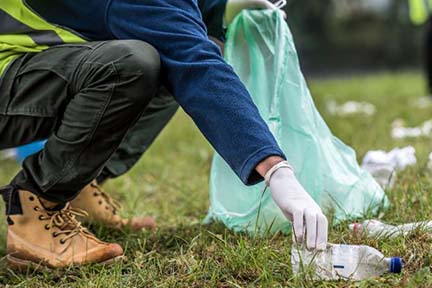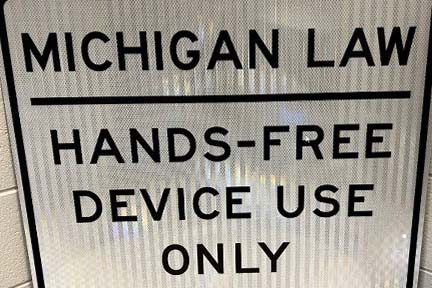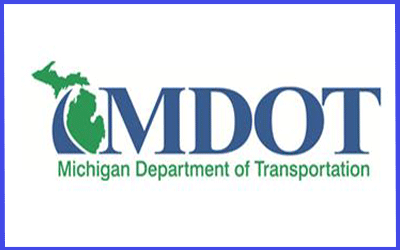
Fatal crash numbers remain high
|
|
|

|
|
|

FOR IMMEDIATE RELEASE MEDIA CONTACT
Second Adopt-A-Highway cleanup coming Saturday Fast facts:
LANSING, Mich. - Motorists should be on the lookout beginning Saturday as Adopt-A-Highway volunteers fan out along state roadways from Ironwood to Monroe picking up litter. Participants in the Michigan Department of Transportation (MDOT) program will clean highway roadsides from July 15 to 23 during the second of three scheduled pickups this year. The popular Adopt-A-Highway program began in Michigan in 1990 and has grown to involve more than 2,900 groups cleaning more than 6,000 miles of highway. Every year, volunteers regularly collect more than 60,000 bags of trash. Getting involved in Adopt-A-Highway is straightforward. Volunteers include members of civic groups, businesses and families. Crew members have to be at least 12 years old and each group must include at least three people. Groups are asked to adopt a section of highway for at least two years. There is no fee to participate. Adopt-A-Highway signs bearing group names are posted along the stretches of adopted highway. When working in a highway right of way, Adopt-A-Highway volunteers wear high-visibility, yellow-green safety vests required by federal regulations. MDOT provides free vests and trash bags, and arranges to haul away the trash. Sections of highway are available for adoption all over the state. Interested groups can get more information on joining the program at www.Michigan.gov/AdoptAHighway The year’s final Adopt-A-Highway pickup is scheduled for the fall, from Sept. 23 to Oct. 1. |


FOR IMMEDIATE RELEASE
June 29, 2023 Contact: Press@michigan.gov
Gov. Whitmer Announces Orange Barrels Will Be Moved to Ease Fourth of July Holiday Weekend Travel
LANSING, Mich. – Today, Governor Gretchen Whitmer announced that starting Friday afternoon, construction will be paused on nearly 60 percent of road and bridge projects statewide to ease traffic delays for holiday travelers. AAA Michigan estimates more than 1.7 million Michigan residents are expected to travel 50 miles or more from home during the Fourth of July holiday weekend, a new record.
“Fourth of July weekend is a time to come together with family and friends to enjoy the splendor of Pure Michigan and celebrate our independence,” said Governor Whitmer. “To ensure Michiganders can get to their destinations safely and on time, we’re moving construction barrels and lifting traffic restrictions. As you hit the road, remember to not text and drive and keep your eyes on the road—our new hands-free driving laws goes into effect on Friday. Next, Wednesday, the hardworking men and women who build our infrastructure will be back in action fixing the damn roads and bridges. Since I took office, we have invested 70% more in our roads than the previous administration to fix nearly 20,000 lane miles of road and 1,400 bridges, supporting over 118,000 jobs. I’m proud of what we have accomplished, and I hope you all have a safe holiday weekend. ”
Beginning at 3:00PM on Friday, June 30, and continuing until 6:00AM on Wednesday, July 5, drivers will see open roads on 99 out of 175 projects statewide. While motorists will see suspended operations in most MDOT work zones for the weekend, drivers are advised that equipment and certain traffic configurations may remain in place, like temporary shifts or shoulder closures.
By the end of this construction season, the Whitmer administration will have fixed nearly 20,000 lane miles of road and 1,400 bridges, supporting more than 89,000 jobs without raising taxes by a dime. These and future repairs are made possible by the Rebuilding Michigan plan, a five-year, $3.5 billion investment in our highways and bridges, and the bipartisan Building Michigan Together Plan, the largest one-time investment in Michigan’s infrastructure in state history. These investments are in addition to investments made by the Biden Administration for infrastructure improvements through the Infrastructure Investment and Jobs Act, which helped repair and rebuild roads and bridges throughout Michigan. These strategic investments in Michigan’s infrastructure ensure that future Michiganders will have safer roads and bridges to run errands, travel, and strengthen the economy.
“Summer traffic means a lot more folks on the road, especially during Fourth of July weekend,” said State Transportation Director Brad Wieferich. “Drivers are certainly aware of all the road and bridge work happening across the state, including those projects made possible thanks to Governor Whitmer’s Rebuilding Michigan program. We ask all drivers to continue to drive safely through work zones and follow all posted signs for their safety, their family’s safety, and for road workers’ safety. Slow down, stay alert and avoid distractions in all work zones. Work zone safety is truly a team effort. Everyone deserves to make it home each and every night.”
Drivers are also reminded that Governor Whitmer recently signed legislation to establish hands-free driving laws. These new laws take effect June 30. More information is available on the Michigan State Police Office of Highway Safety Planning website.
MDOT oversees I, M, and US routes and is responsible for nearly 10,000 miles of state highways, which carry more than 50 percent of all traffic and approximately 70 percent of commercial traffic in Michigan.
Detailed information on work zones that will remain active or have lane restrictions during Independence Day weekend can be found here. If necessary, detour routes will be posted at the project location. All closures are subject to change. For the most up-to-date information on MDOT projects, go to the Mi Drive website at www.Michigan.gov/Drive.
|

|

|
|
|

National Work Zone Memorial returning to PLEASANT, Mich. – For the second year in a row, the Michigan Department of Transportation’s (MDOT) Clare Welcome Center will host the National Work Zone Memorial over the Fourth of July holiday weekend. This special memorial honors the more than 1,600 lives of road workers, motorists, pedestrians, law enforcement, public safety officials, and children who have been killed in work zone crashes throughout the United States. Millions of Michigan drivers are expected to get behind the wheel this summer, with July 4 being one of the busiest travel periods. As traffic volumes increase on Michigan roads, MDOT wants to remind all road users to slow down and drive safely, especially when approaching work zones. Work zone safety remains a top priority for MDOT, and not just for workers but also for the road users who travel through work zones. Preliminary numbers indicate that in 2022, Michigan work zones had 16 fatalities, 862 injuries, and nearly 4,400 total crashes. Nationwide, the number of work zone fatalities is estimated at more than 950. Unveiled in 2002 by the American Traffic Safety Services (ATSS) Foundation, the National Work Zone Memorial is a living tribute to the memory of the lives lost in work zones. As the memorial travels throughout the United States, it raises awareness for work zone safety and safe driving practices by displaying the names of those killed in work zone crashes. The memorial is 20 feet wide and stands 7 feet tall and is available to anyone interested in increasing work zone safety awareness. A new virtual memorial is also available to use at no cost. Costs for hosting the memorial June 28-July 10 at the Clare Welcome Center are sponsored by MDOT and the Michigan Occupational Safety and Health Administration (MIOSHA). Media Inquiries: |